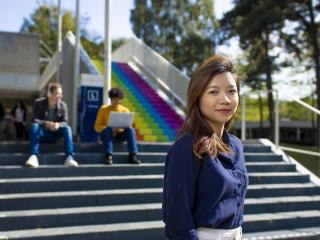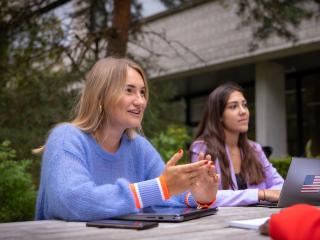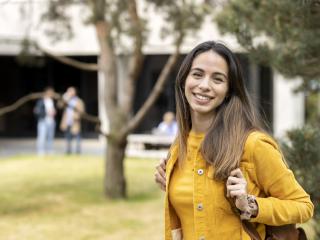Online Culture: Art, Media and Society BA
In the international Bachelor’s program Online Culture: Art, Media and Society (Culture Studies) the focus is on digital culture, (new) media, and globalization. Through different disciplines such as cultural studies and media studies, you study how digitalization and globalization influence our way of living. You study artistic expressions, new ways of communication and social media phenomena, and publish articles or blogs about it on our online platform Diggit Magazine.
Tilburg University student administration
Keuzegids Universiteiten, 2023
Short overview of Online Culture: Art, Media and Society
- You receive an international education with ample room for interaction, guidance and feedback.
- The program is up to date, addressing phenomena that are currently relevant.
- There is a lot of attention for your language- and writing skills. The program has its own online magazine: Diggit Magazine. Within this innovative learning environment, you will publish papers, opinion pieces, and reviews.
Program and courses
Program content
Online Culture: Art, Media and Society is a contemporary, international Bachelor's program in Culture Studies. It is unique in its content and approach as you do not only study digital culture, you also actively contribute to our own online platform Diggit Magazine. Throughout the program, you will write a variety of papers, opinion pieces, and reviews, teaching you everything you need to know about different styles of writing. Combining this expertise with search engine optimization the program aims to train you in valuable skills to use on the job market.
- During the first year, you are introduced to important insights and theories about digital culture, identity, community, and the role that art and artists play in society. In addition, you acquire academic writing and research skills.
- In your second year, you gain more in-depth knowledge. In addition to the compulsory courses, you can choose from a range of elective courses. Finally, you may choose to substitute one elective with an internship, whether within an organization or through a research internship within the Department of Culture Studies.
- The third year offers you the opportunity to create a unique profile with a minor and electives. You can, for example, choose to do your minor at a different university in the Netherlands or abroad. Within the electives, you have the opportunity to do a short internship and/or investigate what it means to be an entrepreneur in the cultural field. You finish the third year with a Bachelor's thesis.
Typical courses are:
- Participatory Art and Performance
Currently, there is more 'interactive art' where the roles of the artist and public are intertwined. You research how artists evoke, promote or provoke involvement - and how the public responds. Furthermore, you study the role technology and online communities play in this interaction. - Digital Media and Politics
Explore various perspectives on the relationship between digital media and politics. How do politicians use new media to gain votes and popularity? Which effects do new media have on political activism? Does social media contribute to democratization, or conversely, undermine it? - Multiculturalism and Identity
Study how life in a multicultural society affects our behavior, communication and language. What kind of skills does this require of us? What do people have to say about the multicultural reality? How is this reality represented in the media and artistic creations?
Beyond your Bachelor's: Extracurricular Activities
Beyond your Bachelor's: Extracurricular Activities
- Join the study association Animo. Animo organizes formal and informal activities, such as lectures, company visits, and get-togethers for Online Culture students.
- Challenge yourself by participating in one of our on-top programs.
After your Bachelor's
Careers and subsequent Master’s programs
After obtaining your Bachelor's degree in Online culture: Art, Media and Society, you can choose to do a Master's program. After you've completed a Master's program, you'll have favorable career prospects as a digital content coordinator, (web)editor or policy advisor.
Graduates found work in the media sector, the corporate industry, the government, education, or started their own business.
Application and admission
Please follow the national application and admission procedure (in Dutch) if you are applying based on a Dutch vwo or hbo-p diploma, regardless of your nationality. A general description of the national application procedure is also available in English.
Admission requirements
- To be eligible for admission to a research university such as Tilburg University, you must have a high school diploma equal to the highest level of secondary education in the Netherlands (the Dutch vwo diploma).
- As this Bachelor’s program is taught entirely in English, you must prove your English language proficiency.
You can find more detailed information about the admission requirements on this program's 'Application and admission' page.
Tuition fees and monthly cost of living
Tuition fees
When you wish to study at Tilburg University, you must pay a tuition fee.
- Tuition fees cover the cost of lectures and facilities provided by the university, such as the extensive university library, Wi-Fi on campus, and symposia and other meetings.
- Tuition fees at Tilburg University are always for one full academic year.
More information on the tuition fees and rates
Estimated monthly costs of living
Besides the tuition fees, you will have living costs and other expenses. You will find life in Tilburg relatively inexpensive compared to life in other Dutch university cities, such as Amsterdam and Utrecht. The approximate cost of living is between € 925 and € 1.125 per month.
| (Furnished) accommodation | Starting from € 550 per month |
|---|---|
| Foods & Drinks | € 200 per month |
| Books & Readers | € 65 per month |
| Insurance | € 100 per month |
| Sport membership | + € 139.95 per year |
Join us at Tilburg University
Do you want more information on this Bachelor's program?
-
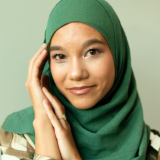
Wulan Bekker
Bachelor student"Online Culture is a study program that allows for the combination of creativity with academic skills, for example by writing for the platform Diggit Magazine. And that is what I love about studying Online Culture!"
-
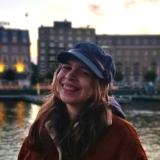
Clara
Bachelor's student“BA Online Culture is a great way to discover the online and offline effects of art and media on our society through many opportunities to learn about research methods, academic writing and everyday life. Here, I got to find and develop my expertise."
-
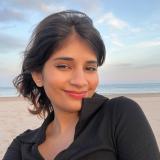
Mallya
Bachelor's student"Studying Online Culture has been incredibly eye opening. You might think you understand the new world of technology but it has offered me so much more in terms of exposure to how things might change in the future and what changes we have now in a depth is astounding."
Study choice activities
Throughout the year you have the opportunity to meet us and learn more about Tilburg University and the programs that we offer. You can take part in various types of events: on-campus, abroad or online.
-
16:00 - 17:00
Housing - Live webinar for Bachelor's and Master's students
Interested in finding accommodation in Tilburg as you get ready to start your studies? Join our interactive Live Webinar on Housing on April 25. Meet our international team and learn more about the city. You can join the 1-hour webinar either at 10:00 or 16:00 CEST.
-
13:30 - 15:45
Campus Experience
Are you curious about life as a student at Tilburg University, or not sure which university you want to attend? Join our Campus Experience on Wednesday
May 8! Discover our compact and green campus with one of our students and find out if Tilburg University is your future home. -
To be announced
Bachelor's Open day
Find out everything about studying in Tilburg in the Netherlands during the Bachelor's Open day on November 2. Check out our offer of international Bachelor's programs and talk to students, teachers and study advisors.
All information in one e-brochure
Create your own e-brochure with information on program content, admission requirements, career prospects, and student life in Tilburg.
All information in one e-brochure
Are you and Online Culture: Art, Media and Society a match? If you...
-
want to deepen your understanding of the contemporary (digital) media culture
-
are curious about the interplay between (online) media, art and culture in a digitalized and globalized society
-
are interested in communication in a globalized world
-
are interested in questions regarding identity, communities, social interaction and politics
Then this is the program for you!

